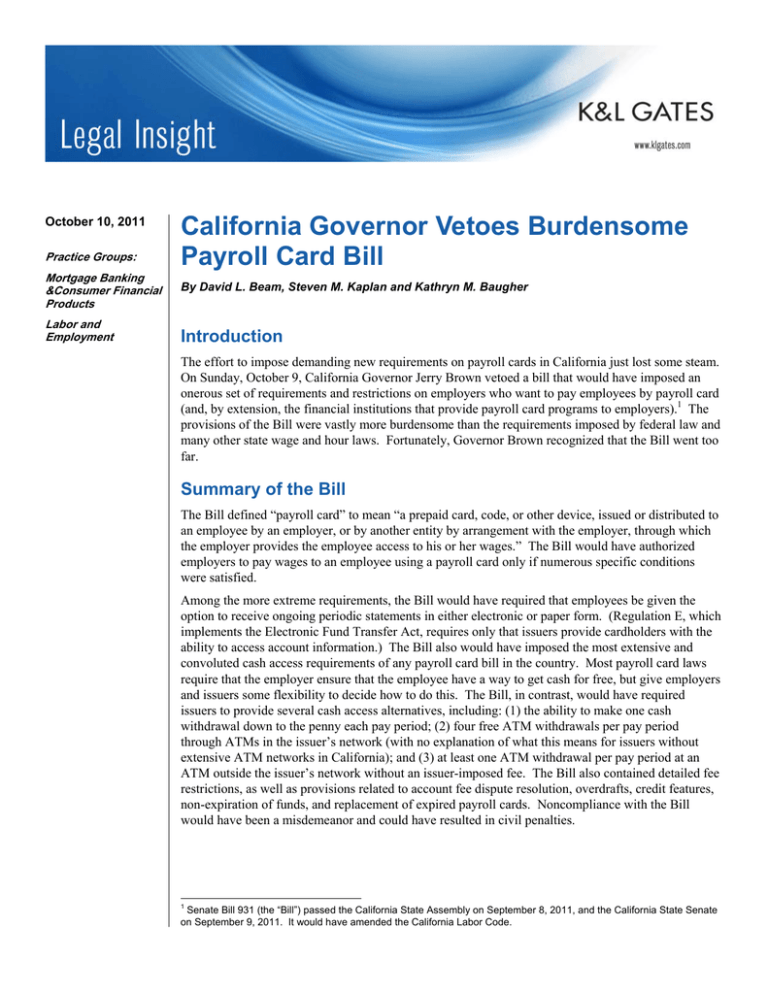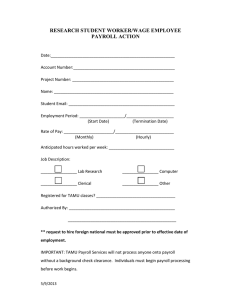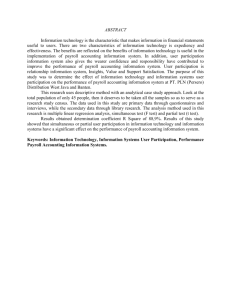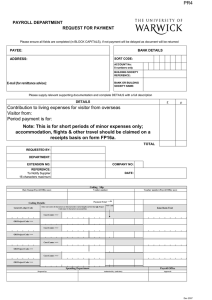California Governor Vetoes Burdensome Payroll Card Bill Introduction
advertisement

October 10, 2011 Practice Groups: Mortgage Banking &Consumer Financial Products Labor and Employment California Governor Vetoes Burdensome Payroll Card Bill By David L. Beam, Steven M. Kaplan and Kathryn M. Baugher Introduction The effort to impose demanding new requirements on payroll cards in California just lost some steam. On Sunday, October 9, California Governor Jerry Brown vetoed a bill that would have imposed an onerous set of requirements and restrictions on employers who want to pay employees by payroll card (and, by extension, the financial institutions that provide payroll card programs to employers).1 The provisions of the Bill were vastly more burdensome than the requirements imposed by federal law and many other state wage and hour laws. Fortunately, Governor Brown recognized that the Bill went too far. Summary of the Bill The Bill defined “payroll card” to mean “a prepaid card, code, or other device, issued or distributed to an employee by an employer, or by another entity by arrangement with the employer, through which the employer provides the employee access to his or her wages.” The Bill would have authorized employers to pay wages to an employee using a payroll card only if numerous specific conditions were satisfied. Among the more extreme requirements, the Bill would have required that employees be given the option to receive ongoing periodic statements in either electronic or paper form. (Regulation E, which implements the Electronic Fund Transfer Act, requires only that issuers provide cardholders with the ability to access account information.) The Bill also would have imposed the most extensive and convoluted cash access requirements of any payroll card bill in the country. Most payroll card laws require that the employer ensure that the employee have a way to get cash for free, but give employers and issuers some flexibility to decide how to do this. The Bill, in contrast, would have required issuers to provide several cash access alternatives, including: (1) the ability to make one cash withdrawal down to the penny each pay period; (2) four free ATM withdrawals per pay period through ATMs in the issuer’s network (with no explanation of what this means for issuers without extensive ATM networks in California); and (3) at least one ATM withdrawal per pay period at an ATM outside the issuer’s network without an issuer-imposed fee. The Bill also contained detailed fee restrictions, as well as provisions related to account fee dispute resolution, overdrafts, credit features, non-expiration of funds, and replacement of expired payroll cards. Noncompliance with the Bill would have been a misdemeanor and could have resulted in civil penalties. 1 Senate Bill 931 (the “Bill”) passed the California State Assembly on September 8, 2011, and the California State Senate on September 9, 2011. It would have amended the California Labor Code. California Governor Vetoes Burdensome Payroll Card Bill The Veto On Sunday, October 9, Governor Brown returned Senate Bill 931 to the California State Senate without his signature.2 In his veto message to the Senate, Governor Brown explained that he supports the goal of containing costs for workers who choose to accept payroll cards. However, Governor Brown stated that the Bill went too far, imposing “numerous and costly new requirements on pay card providers.” Governor Brown considered it likely that, as a result of these mandates, financial institutions and employers would stop offering payroll cards, thereby injuring the very employees the Bill was designed to protect. Governor Brown expressed his intent to work with the Bill’s proponents and financial institutions to come up with a set of more reasonable employee protections that the Governor would be willing to sign into law. _________________________________________________________________________________ K&L Gates’ payroll card practice is an interdisciplinary team of lawyers from our Consumer Financial Services Practice Group and Employment Group. K&L Gates advises both financial institutions and employers on state and federal regulatory requirements related to payroll cards. Authors: David L. Beam Partner david.beam@klgates.com +1. 202.778.9026 Steven M. Kaplan Partner steven.kaplan@klgates.com +1. 202.778.9204 Kathryn M. Baugher Associate kathryn.baugher@klgates.com +1. 202.778.9435 2 A copy of Governor Brown’s veto message is available at http://gov.ca.gov/docs/SB_931_Veto_Message.pdf. 2


